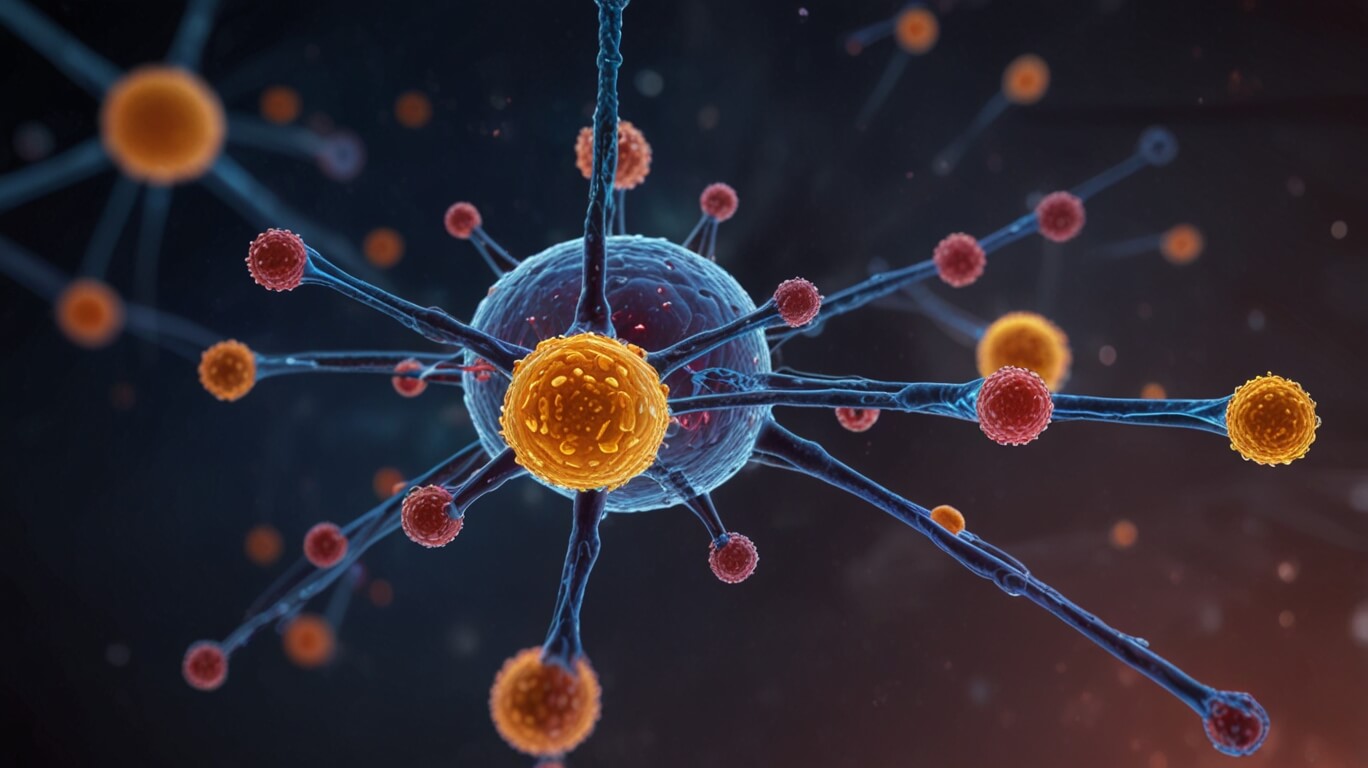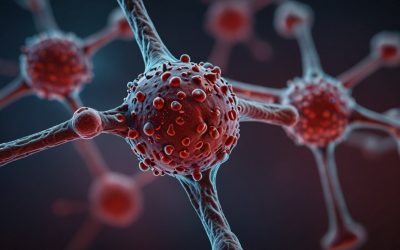Persistent pain, perpetual problems—these phrases might resonate with you if you’re grappling with the grind of chronic inflammation. As your body’s biological response to harmful stimuli, inflammation is a necessary defense mechanism, but when it lingers, it becomes a silent saboteur of your health. You’re aware that your immune system plays a pivotal role in this process, yet the complexities of its involvement in chronic inflammation might not be fully clear to you. Consider the myriad ways in which this unyielding response can insidiously influence your well-being, from contributing to heart disease to exacerbating conditions like rheumatoid arthritis. As you navigate the nuances of inflammation’s impact, you’ll uncover how lifestyle choices and medical interventions can either mitigate or magnify these effects. Stay tuned, as unraveling the intricate interplay between your immune system and chronic inflammation could be the key to unlocking a more balanced, healthier life.
Key Takeaways
- Chronic inflammation is a dysregulated condition where the immune system’s inflammatory cells and mediators become imbalanced.
- Pro-inflammatory cytokines and reactive oxygen species (ROS) play a pivotal role in chronic inflammation.
- Chronic inflammation is linked to a wide array of noncommunicable diseases, including cardiovascular disease, type 2 diabetes, autoimmune diseases, and neurodegenerative diseases.
- Lifestyle factors such as obesity, smoking, stress, and poor dietary choices can perpetuate chronic inflammation, while healthy lifestyle choices like exercise and consuming fruits and vegetables can help mitigate it.
Immune System Overview

To understand the impacts of chronic inflammation, it’s essential to first examine the immune system, a complex network tasked with protecting the body from infection and disease. This system orchestrates an immune response involving a myriad of immune cells designed to eliminate pathogens and facilitate healing. When an acute inflammatory event occurs, it starts rapidly and becomes severe in a short time, typically manifesting symptoms that may last for a few days. Acute inflammation is a critical defense mechanism that activates immune cells and inflammatory cells to address injuries or infections.
However, unlike the prompt resolution characteristic of acute inflammation, chronic inflammation is a protracted process. It persists over several months to years, and the extent of its effects varies based on the cause of injury and the body’s capacity for repair. The innate immune system, which provides the first line of defense through nonspecific mechanisms, can become continuously engaged, leading to the sustained presence of pro-inflammatory cytokines. These cytokines are signaling molecules that promote the inflammatory response, which, when not properly regulated, contribute to the pathology of chronic inflammation.
Chronic inflammatory diseases represent a considerable global health burden, being a principal cause of death worldwide. The prevalence of conditions associated with chronic inflammation—such as diabetes, cardiovascular diseases, arthritis, allergies, and chronic obstructive pulmonary disease (COPD)—is expected to rise persistently. Chronic inflammation is intricately involved in various disease processes, including Alzheimer’s disease, asthma, cancer, heart disease, rheumatoid arthritis, and type 2 diabetes, underscoring the immune system’s dual role as protector and potential perpetrator in disease progression. Thus, a comprehensive understanding of the immune system’s function is fundamental for those dedicated to serving and improving the health of others.
Chronic Inflammation Dynamics
Having established the immune system’s role in acute versus chronic responses, we’ll now explore the mechanics of chronic inflammation and its extensive implications for long-term health. Chronic inflammation is not merely a prolonged version of the acute phase but a complex condition where the immune system’s network of inflammatory cells and mediators becomes dysregulated. This maladaptive response can persist for months or years, often without the clear signs of acute inflammation such as redness, heat, and swelling.
In chronic inflammatory disorders, pro-inflammatory cytokines and reactive oxygen species (ROS) play a pivotal role, contributing to tissue deterioration and the development of diseases such as arteriosclerosis, dementia, and cancer. This inflammation and oxidative stress create a harmful cycle, where one perpetuates the other, exacerbating the risk of chronic inflammation and its sequelae.
Control of chronic inflammation thus becomes critical in preventing a myriad of chronic diseases. Exercise, as an intervention, displays powerful anti-inflammatory properties. It not only dampens the activity of inflammatory cells but also modulates the immune system’s response. Regular physical activity can prevent muscle atrophy and protect against tissue damage that fuels chronic inflammation.
For those dedicated to serving others, understanding the role of exercise in mitigating inflammation is key. It enables the development of targeted therapies and promotes the integration of physical activity into clinical practice. As such, elucidating the precise anti-inflammatory mechanisms of exercise is vital, as it offers a non-pharmacological approach to reducing the burden of chronic diseases and enhancing the quality of long-term health.
Health Impacts of Inflammation

Chronic inflammation acts as a common thread linking a wide array of noncommunicable diseases, demanding attention for its role in deteriorating long-term health outcomes. This systemic inflammation not only underpins acute responses but, when unresolved, gives rise to chronic conditions. Inflammatory cells that typically protect you through immune responses can, over time, contribute to tissue damage and organ dysfunction.
Consider the following impacts of chronic inflammation on health:
- Cardiovascular Disease: Inflammatory mediators play a critical role in atherosclerosis, substantially increasing your risk of heart attacks and strokes.
- Type 2 Diabetes Mellitus: Chronic inflammation impairs insulin signaling, exacerbating glucose intolerance and insulin resistance, precursors to diabetes.
- Autoimmune Diseases: The persistent activation of inflammatory cells can lead to autoimmune conditions, where your body’s defenses mistakenly attack healthy tissues.
- Cognitive Decline: Systemic inflammation is implicated in neurodegenerative diseases, potentially accelerating memory loss and cognitive dysfunction.
These outcomes illustrate the gravity of chronic inflammation as a health concern. Risk factors such as obesity and lifestyle choices like smoking can perpetuate the inflammatory response, underscoring the importance of preventive measures. Furthermore, chronic diseases often have a bi-directional relationship with chronic inflammation; for example, the presence of cardiovascular disease can aggravate systemic inflammation, creating a vicious cycle that challenges intervention efforts.
You have the ability, through your choices and actions, to influence the inflammatory process. It’s crucial to recognize symptoms, understand risk factors, and pursue lifestyle modifications and treatments that can mitigate the harmful effects of chronic inflammation. Addressing this hidden menace is essential for safeguarding long-term health and enhancing the quality of life for those you serve.
Lifestyle Factors and Inflammation
Your daily lifestyle choices, including diet, exercise, and stress management, play a pivotal role in regulating chronic inflammation and its associated health risks. Physical inactivity, a component of lifestyle factors, significantly contributes to the development of metabolic syndromes and age-related disorders by perpetuating chronic inflammation. Furthermore, pro-inflammatory mediators, such as cytokines, are exacerbated by poor diet and lifestyle choices, potentially triggering arteriosclerosis and tissue degeneration.
| Lifestyle Factor | Impact on Inflammation | Intervention Strategy |
|---|---|---|
| Physical Activity | Reduces chronic inflammation | Integrate regular exercise into daily routine |
| Diet | Promotes or alleviates inflammation | Emphasize foods with anti-inflammatory properties |
| Stress Management | Modulates inflammatory responses | Implement stress reduction techniques |
Regular exercise, with its robust anti-inflammatory effects, not only improves immune function but also reduces the risk of chronic diseases. The incorporation of exercise interventions into clinical practice and public health programs is instrumental in reducing chronic inflammation and enhancing health outcomes.
Maintaining a healthy weight, avoiding pro-inflammatory foods rich in unhealthy fatty acids, and managing stress through effective strategies are essential for controlling chronic inflammation. The high-sensitivity C-reactive protein (hs-CRP) test, an indicator of chronic inflammation, often reflects the influence of diet and lifestyle on an individual’s inflammatory status.
Managing Persistent Inflammation

To manage persistent inflammation effectively, it’s crucial to incorporate regular exercise into one’s health regimen as it plays a significant role in mitigating inflammatory responses and bolstering immune function. Exercise not only reduces the level of inflammatory cytokines but also stimulates the production of anti-inflammatory substances within the body. This biological change is instrumental in combating chronic diseases associated with inflammation, such as arthritis, rheumatoid arthritis, and psoriatic arthritis.
When managing persistent inflammation, consider these actions to support the immune system and reduce the impact of chronic inflammation:
- Engage in Low-Impact Aerobic Activities: Regular activities like walking, swimming, or cycling can reduce inflammation without overstraining joints, especially important for arthritis sufferers.
- Incorporate Strength Training: Building muscle helps control weight and metabolic function, both of which are essential in managing chronic inflammation.
- Practice Stress-Reduction Techniques: Stress exacerbates inflammation; therefore, techniques like mindfulness, yoga, and meditation can have a profound anti-inflammatory effect.
- Consult Healthcare Providers: It’s important to work with healthcare professionals to integrate appropriate anti-inflammatory drugs and supplements into one’s treatment plan for optimal care.
Your approach should be analytical and precise, employing a scholarly understanding of the complex interplay between lifestyle choices and persistent inflammation. It’s not merely about alleviating symptoms but rather about initiating a proactive and holistic response to maintain the equilibrium of the immune response. The goal is not only to serve oneself but to empower others in managing their inflammation and enhancing their overall well-being.











